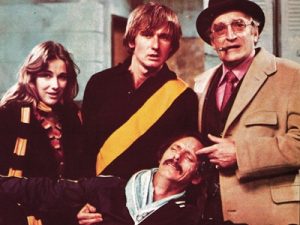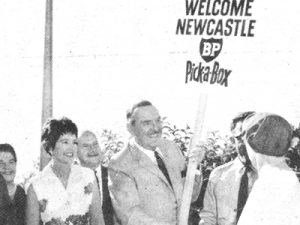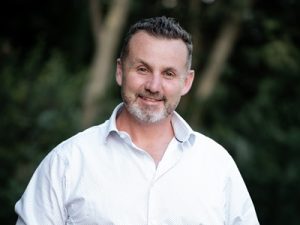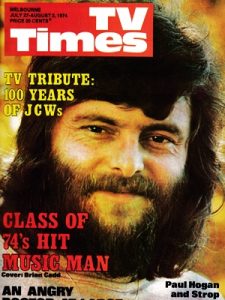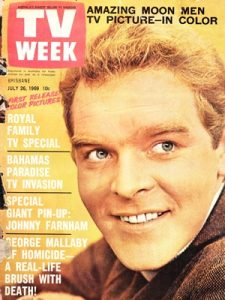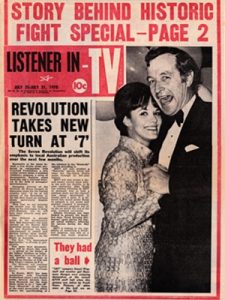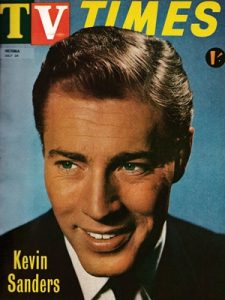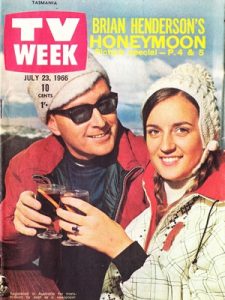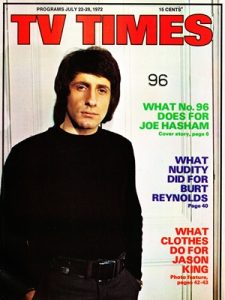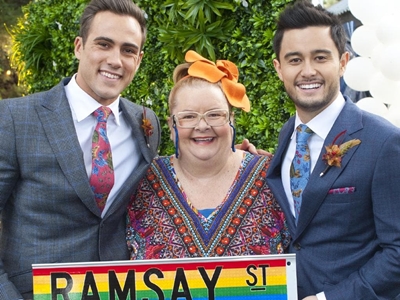
This week Neighbours (6.30pm weeknights, Eleven) makes Australian television history with its first same-sex wedding.
Aaron Brennan (Matt Wilson) and David Tanaka (Takaya Honda) will be wed by celebrant Jemima Davies-Smythe, played by Magda Szubanski. Actor, comedian and writer Szubanski was a prominent spokesperson in the marriage equality campaign which culminated in same sex marriage becoming legal in Australia in November last year.
The Neighbours wedding shows that we have come a long way not just as a society but as far as gay people are depicted on television.
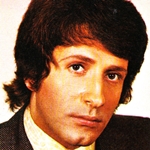 It is a journey that began back in 1972 in the 0-10 Network series Number 96 and two of the show’s original characters, law student Don Finlayson (Joe Hasham, pictured) who was having a relationship with photographer Bruce Taylor (Paul Weingott). But it was Don’s later relationship with movie buff Dudley Butterfield (Chard Hayward) that was the series’ most enduring and popular with viewers. Number 96 creator David Sale was clear from the outset that he wanted to have gay characters when developing the series. In 1974 he told Woman’s Day, “I wanted to put in a couple of homosexuals. But I did want to get away from the concept of homosexuals being all flapping and effeminacy – the homosexuals in 96 are nice people. They don’t wear eye-shadow, carry handbags, or hang about public toilets. I do think the characters of Don and Dudley have done more to put homosexuals in some sort of reasonable light than the whole of the Gay Lib movement.”
It is a journey that began back in 1972 in the 0-10 Network series Number 96 and two of the show’s original characters, law student Don Finlayson (Joe Hasham, pictured) who was having a relationship with photographer Bruce Taylor (Paul Weingott). But it was Don’s later relationship with movie buff Dudley Butterfield (Chard Hayward) that was the series’ most enduring and popular with viewers. Number 96 creator David Sale was clear from the outset that he wanted to have gay characters when developing the series. In 1974 he told Woman’s Day, “I wanted to put in a couple of homosexuals. But I did want to get away from the concept of homosexuals being all flapping and effeminacy – the homosexuals in 96 are nice people. They don’t wear eye-shadow, carry handbags, or hang about public toilets. I do think the characters of Don and Dudley have done more to put homosexuals in some sort of reasonable light than the whole of the Gay Lib movement.”
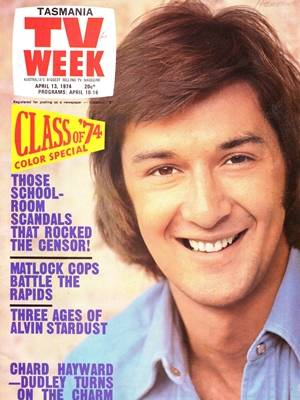
Despite writing gay characters into the series, Sale later wrote in his biography Number 96, Mavis Bramston And Me that network executives were pressuring the show’s producer Bill Harmon to turn the characters straight — despite their immense popularity with viewers. Hasham was receiving more fan mail than any other actor in the series, sometimes from dazed young females determined to turn Don “straight” but more significantly from gay men, sometimes being very isolated in country areas, who were finally seeing someone that represented their reality on television without any sense of gossip or derision.
In 1974, Hasham told TV Times: “Almost a quarter of all the letters I get is the male mail. They say they’re homosexuals and they’re writing to thank me for portraying a homosexual character who isn’t a limp-wristed screaming queen. There are others that are terrifying and tragic; heart-rending letters from young men who pour out their souls to me because apparently in their loneliness they have no one else who will listen.”
The portrayals of Don Finlayson and Dudley Butterfield were written and performed with utmost normalcy, and with producer Harmon threatening to take the top-rating series to a rival network, 0-10 executives eventually stepped back in pushing the characters to become straight.
Finlayson in particular was often the sole voice of reason and sensibility amongst a series of characters that sometimes, deliberately, was anything but with its mix of melodramatic and comedic tales. The biggest joke to come from the show’s gay characters was that neighbourhood gossip Dorrie Evans (Pat McDonald) remained delightfully oblivious of their situation for the entirety of the series even though everyone else around them just calmly knew and accepted it.
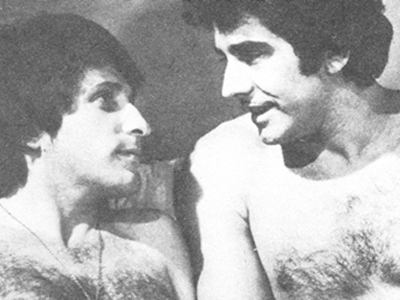
But despite how groundbreaking Number 96 was with its depictions of characters like Don and Dudley, there were still some limitations. Any form of physical contact between the characters was strictly off limits — not even so much as holding hands or an innocent kiss was allowed. With more generous rules surrounding censorship in films, it was a restriction that was able to be lifted somewhat when Number 96 The Movie went into production in 1973, with Don ending up in bed with Simon Carr (John Orcsik), although even then the couple’s kiss was cut from the final product.
The character of Don Finlayson was one of only three from Number 96‘s first episode to be seen through to the end of the series in 1977.
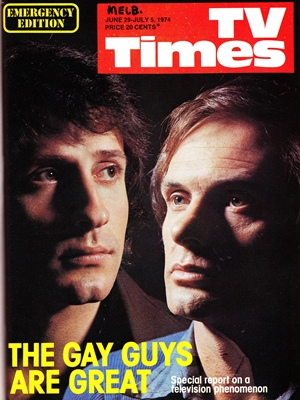
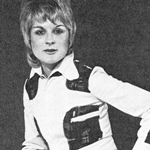 The success of Number 96 led the same network in 1973 to commission The Box, set in a television station but like 96 featured adults-only storylines. As far as depiction of gay characters, The Box stepped up on the foundations laid by 96, with bisexual reporter Vicki Stafford (Judy Nunn, pictured) having a kiss with Felicity Baker (Helen Hemingway) in the show’s opening episode. The series also featured the character of producer Lee Whiteman (Paul Karo), who was definitely portrayed as camp but often with the purpose of providing some balance to the show’s heavily dramatic situations. Karo told TV Times that he had originally intended to portray Whiteman as a more sophisticated character. “I think it would have been more authentic, but the role calls for me to play it camp and that’s the way it is.”
The success of Number 96 led the same network in 1973 to commission The Box, set in a television station but like 96 featured adults-only storylines. As far as depiction of gay characters, The Box stepped up on the foundations laid by 96, with bisexual reporter Vicki Stafford (Judy Nunn, pictured) having a kiss with Felicity Baker (Helen Hemingway) in the show’s opening episode. The series also featured the character of producer Lee Whiteman (Paul Karo), who was definitely portrayed as camp but often with the purpose of providing some balance to the show’s heavily dramatic situations. Karo told TV Times that he had originally intended to portray Whiteman as a more sophisticated character. “I think it would have been more authentic, but the role calls for me to play it camp and that’s the way it is.”
From Number 96 and The Box there have varying degrees of gay characters featured in Australian dramas. Prisoner, set in a women’s prison, had an emphasis on lesbian characters including prison inmates Franky Doyle (Carol Burns) and Judy Bryant (Betty Bobbitt) — though not with each other — and prison officer Joan Ferguson (Maggie Kirkpatrick), though very little was actually portrayed on screen. However it is a theme that is also portrayed, sometimes rather graphically, in the Prisoner-inspired series Wentworth.
Gay characters in shows like Skyways and Cop Shop were probably more of an incidental feature, although an early storyline in Cop Shop had Gary Foster (Andrew McKaige) in conflict with his father, police detective Tom (Peter Sumner), over revelations that Gary had been in a relationship with another man. Meanwhile, Tom is revealed to be involved in a series of gay bashings around the area.
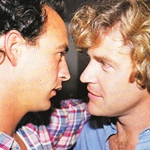 The ABC drama GP featured Dr Martin Dempsey (Damian Rice) coming out as gay to his medic colleagues, and later having a relationship with Patrick Walsh (Lochie Daddo), the brother of one of his patients.
The ABC drama GP featured Dr Martin Dempsey (Damian Rice) coming out as gay to his medic colleagues, and later having a relationship with Patrick Walsh (Lochie Daddo), the brother of one of his patients.
There have also been significant “coming out” storylines in Breakers and The Secret Life Of Us, and the more recent series House Husbands featured a male couple bringing up a daughter.
Neighbours, while hosting this week’s same sex wedding, has also not been shy in portraying gay characters and relationships in the past, including teen Chris Pappas (James Mason) coming to terms with his sexuality and later forming a relationship with Aidan Foster (Bobby Morley), and a short-lived relationship between Sky Mangel (Stephanie McIntosh) and Lana Crawford (Bridget Neval). There have also been other incidental characters along the way, such as builder Andrew ‘Macca’ McKenzie (John Morris) back in 1994.
Fellow soap Home And Away has had a somewhat more reluctant approach to featuring sexually diverse characters, despite it carrying the more mature “PG” rating to Neighbours, which up until recently was rated G. Several years ago, a relationship between two females was met with criticism from conservative groups, resulting in a kiss being edited out before going to air. The plot later saw one of the pair enter into a relationship with a man.
However, more recently, the series has featured the storyline of Ty Anderson (Darius Williams) coming out.
Source: Aussie Soap Archive. Super Aussie Soaps, Andrew Mercado. Number 96, Mavis Bramston And Me, David Sale. TV Times, 29 June 1974.
